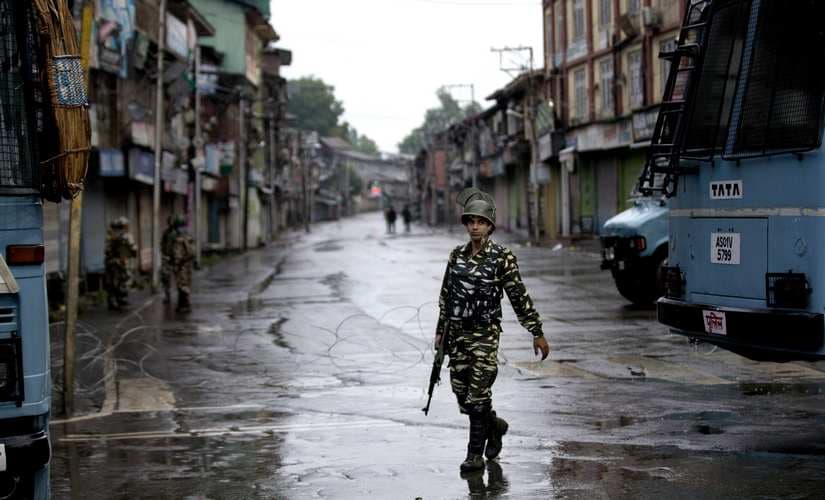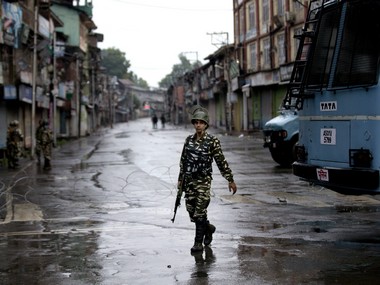Joining the Dots is a weekly column by author and journalist Samrat in which he connects events to ideas, often through analysis, but occasionally through satire *** The fighting has escalated again in Kashmir. Last Saturday night, two officers and two jawans of the Indian Army and a police sub-inspector were killed in militant violence in Handwara in Kashmir. A day later, three men of the Central Reserve Police Force (CRPF) died in another attack in the same area. Is it just another summer of discontent in the valley, where the annual melting of snows from mountain passes coincides with an uptick in the temperature of militancy? Perhaps, but this summer is also different for the wider region and world from the previous ones. It is, after all, a summer when the whole world is in the grip of a pandemic-induced lockdown. It is also a summer when, almost forgotten in the midst of all this, the American government is trying to implement an agreement it signed with the Taliban in February for the withdrawal of its troops from Afghanistan after 18 years of war. Across the border in Pakistan, mainstream political tensions involving a crackdown on opposition leaders Nawaz and Shehbaz Sharif are rising. There are also worrying signs of shadowy actions underway. Last Friday, the leader of the Pashtun Tahafuz Movement, Arif Wazir, was shot outside his home and subsequently died. The PTM have a slogan, “Ye jo dehshatgardi hai, iske peeche wardi hai" (This terrorism, the uniform is behind it). Unlike the Pakistani Taliban, they are in the bad books of the powerful Pak military. [caption id=“attachment_7370351” align=“alignnone” width=“825”]  Representational image. AP[/caption] In faraway Sweden the same day, police confirmed that a body found in a river a week earlier was that of Sajid Hussain, exiled Editor of the Balochistan Times. In Karachi, a court ordered the release of Omar Saeed Shaikh, the terrorist convicted for the beheading of Wall Street Journal reporter Daniel Pearl, who was one of three released by the Indian government in 1999 following the hijacking of IC-814 to Kandahar. He has been detained for a further three months, for now. The clash over Kashmir between India and Pakistan is heating up against this wider background. The usual focus of the dispute is the Kashmir Valley, but this time, the region of Gilgit-Baltistan made an early appearance in the arguments between the two sides. India protested a ruling of the Pakistan Supreme Court to enable holding of elections in that area. “India completely rejects such actions and continued attempts to bring material changes in Pakistan occupied areas of the Indian territory of Jammu & Kashmir. Instead, Pakistan should immediately vacate all areas under its illegal occupation,” India’s Ministry of External Affairs said in a statement. How the mountainous tracts of Gilgit-Baltistan with their predominantly Shina and Balti populations came to be part of the former princely state of Jammu and Kashmir is a fascinating cloak and dagger tale played out in the later years of the 19th Century. It involved local chieftains such as the Mir of Hunza and the Mehtar of Chitral, the Dogra Maharaja of Jammu and Kashmir, and the prime players of what subsequently became famed as the Great Game – the Russian and British empires. Almost forgotten in the tale of their exploits was another party, which occupied the lands just north of the borders of Gilgit-Baltistan: the Chinese empire. It was to Yarkand in Sinkiang, now Xinjiang, in China, that the Mir of Hunza fled after defeat to British and Dogra forces in 1891-92. The flow of people and cultures between India, Persia and western China over the Pamir, Karakoram and Hindukush mountains is ancient, going back at least as far as the Guishangs, known in India as Kushans, who founded an empire in that part of the world in the second century BC. Signs of and references to the old connectedness of those seemingly distant spaces pop up in our lives to this day, even in popular culture. Among the many wonderful songs on Coke Studio, there’s one called Bibi Sanam Janam, by the Pakistani singers Zeb and Haniya. It is a beautiful song in the Dari language that likens the sanam (beloved) to the pomegranate of Sistan and talks of her home by the doors of Tashkorgan. Dari is the Persian spoken in Afghanistan. Sistan is a trans-border region of eastern Iran and southern Afghanistan bordering Balochistan. Tashkorgan is in Xinjiang in China. The sweet song is a tale that spans many borders and territories. Such connectedness is as contemporary as it is ancient. Tashkorgan today is the first stop on the Chinese side of the border on the Karakoram Highway, which leads on to the Silk Road oasis of Kashgar. It is a vital part of the China-Pakistan Economic Corridor whose terminus is the Arabian Sea port of Gwadar near Sistan. The prospects of Pakistan heeding India’s demand to vacate these areas are about as bright as the prospects of India vacating the state of Jammu and Kashmir on Pakistan’s asking. India, as everyone probably remembers, has been tightening its grip on Jammu and Kashmir since last October. Article 370 is gone, and Ladakh, which is bigger in area than what remains of Jammu and Kashmir, is now a separate union territory. The map of the old princely state has been formally redrawn. That, the abrogation of Article 370, and the tighter integration of Gilgit-Baltistan into Pakistan, suggest that the Kashmir issue is being resolved by India and Pakistan one step at a time through the formalisation of the status quo, partly along the contours of what is known as the Dixon Plan. The occupation of Kashmir and its integration into the Indian subcontinent is part of a historical process that began when Mughal emperor Akbar conquered the kingdom in 1586. It picked up pace in colonial times as concerns over the defence of the northern frontiers of India against possible Chinese and Russian expansionism prompted British expansion into the region. The Russian empire eventually left neighbouring Afghanistan in 1988. The Chinese empire is now the one expanding its influence in the wider region. Back in the 19th Century when the Russian, British and Chinese empires were jockeying for influence in the remote mountain fastnesses where the Himalayas, Hindukush and Pamirs meet, the friction of distance was still a hard, physical reality. Today the difficulty for borderlands everywhere is that distance is largely dead. State cores are filling out, expanding into their peripheries. The actions of both India and Pakistan in their parts of Kashmir have to be viewed in that context. The ability of India to unilaterally change the realities on the ground in Gilgit-Baltistan, with near-certainty of Chinese involvement, is remote. The ability of terrorism to shake India’s grip on Kashmir is negligible. The ability of Pakistan to do so has also been found wanting in all the wars that the countries have fought since 1947, and that is not about to change now that both countries openly wield nuclear weapons. There are powerful emotions and genuine grievances all around, but it seems unlikely that continued conflict would achieve anything beyond a satisfaction of bloodlust.
The fighting has escalated again in Kashmir. Last Saturday night, two officers and two jawans of the Indian Army and a police sub-inspector were killed in militant violence in Handwara in Kashmir. A day later, three men of the Central Reserve Police Force died in another attack in the same area.
Advertisement
End of Article


)

)
)
)
)
)
)
)
)



